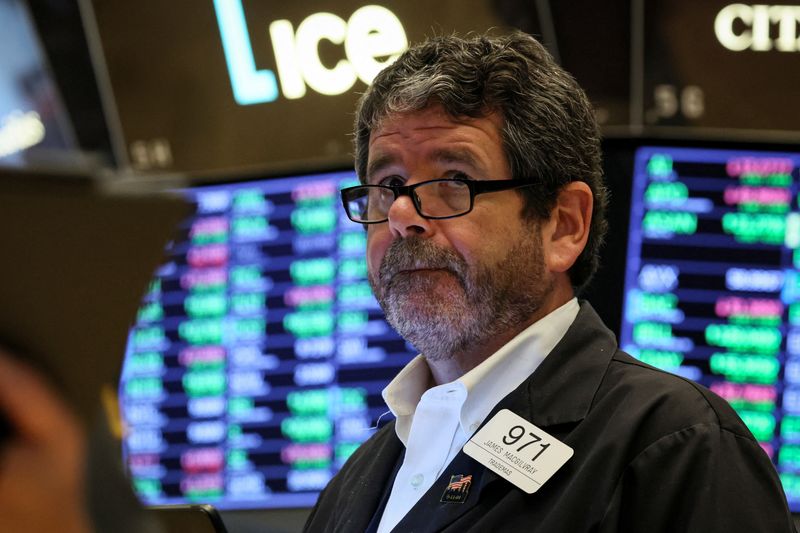NEW YORK (Reuters) - The S&P 500 fell to its lowest level in almost two years on Tuesday on worries about super aggressive Federal Reserve policy tightening, trading under its old 2022 low from June and leaving investors appraising how much further stocks would have to fall before stabilizing.
After the benchmark index fell more than 20% from its early January high to a low on June 16, which confirmed that the retreat was indeed a bear market, the S&P then rallied into mid-August before running out of gas.
That bear-market rally is now over.
[.N]
MARKET REACTION: STOCKS: The S&P 500 lost 10.94 points, or 0.30%, to stand at 3,644.1, just above the old low at 3,636.87. The Dow Jones Industrial Average fell 138.43 points, or 0.47%, to 29,122.38
COMMENTS:
CHRISTIAN LEDOUX, DIRECTOR OF INVESTMENTS, CAPTRUST, TEXAS
"Investors are stuck in a period of uncertainty where we won’t be hearing from the Fed again until November and Fed policy is the primary weight on the stock market. Even if the inflation data gets better with the next report in mid-October, we won’t know how the Fed will react to it. The recent comments from the Fed has been unilateral in its commitment to stay the course, investors may doubt that even a meaningful improvement in inflation would result in the Fed pausing its tightening cycle.
"Many strategists we follow believe a recession would bring S&P earnings per share to $190-$200 (from the current run rate of about $225). Back-of-the-napkin math with a 10-year treasury yield of around 3.5% (potentially dropping below 3% in a recessionary environment) should translate to around 17-20x P/E multiple for the index. That would equate to about $3300 on the index level or about 10% more downside to this hypothetical downside scenario.
"Inflation is the top data point to watch, as that will ultimately drive Fed policy."
CAROL SCHLEIF, DEPUTY CHIEF INVESTMENT OFFICER, BMO FAMILY OFFICE, MINNEAPOLIS, MINNESOTA
“In my 40 years in the business, I’ve never seen coincident bear market in both bonds and stocks so investors are unsettled with nowhere to hide”
“No one quite knows how to parse the global data, geopolitics or policy moves – both super stimulative and restrictive, so markets are unsure which to hinge to”
“Sentiment has become very bearish (which is a long term positive for potential market rebound) – but it can stay bearish for a bit. Also, no overt catalysts to propel breakout to the upside”
“Markets had “fought the Fed” all year, hoping for more dovish tilt soon. Fed’s message last week was unequivocal, so even though some of the data is supportive of peaked inflation, investor sentiment is approaching wash out level.”
MICHAEL PURVES, CHIEF EXECUTIVE, TALLBACKEN CAPITAL ADVISORS, NEW YORK
"I am a little bit less concerned about a new closing low. I think that is an interesting data point but it doesn't really mean we can't get a very substantial relief rally, nor does it mean we can't go further down too."
"What equity volatility really needs is Treasury volatility to come in here and they are not ... we are just seeing yields sky-rocketing."
"The bond market is king here, you got to respect that."
"I think there is a good scenario where once we get through the bond market violence we get to a more tradable bottom. There is a good case for that to happen if we get some inflation data that is a lot less scary than the last report."
ROBERT PAVLIK, SENIOR PORTFOLIO MANAGER, DAKOTA WEALTH, IN FAIRFIELD, CONNECTICUT "It's disappointing, but it's not a surprise. We've been heading that way." "People are concerned about the Federal Reserve, the direction of interest rates, the health of the economy, and also the next couple of weeks with earnings season coming up and companies reporting lower-than-expected earnings." (The support level for the S&P is) "a stretch at 3400, maybe 3200 and the worst case is probably 3000."
TIM GHRISKEY, SENIOR PORTFOLIO STRATEGIST, INGALLS & SNYDER, NEW YORK

"It's all about the Fed, and as long as the Fed continues to raise rates, and investors don't anticipate an end of the rate hikes, I think this market is going to continue to be weak. Having said that, we've seen a number of bear market rallies, year to date. So, would I be surprised to see the market bounce up again? No, I wouldn't. Traders are looking for opportunities like that. But in terms of a sustained rally, I think it really takes anticipating the end of Fed rate hikes."
(Story corrects job title of Christian Ledoux, first commentator, to director of investments, not chief investment officer)
(Americas Economics and Markets Desk; +1-646 223-6300)